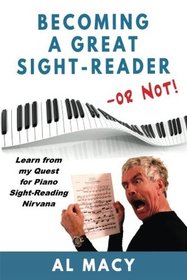Search -
Becoming a Great Sight-Reader -- or Not!: Learn from my Quest for Piano Sight-Reading Nirvana
Becoming a Great SightReader or Not Learn from my Quest for Piano SightReading Nirvana
Author:
On December 10, 2007, author Al Macy decided to become a great (or at least, good) piano sight-reader. Although he was already a gigging jazz pianist, his sight-reading was lousy. As he puts it "It was really lousy. Most seven-year-olds with a year of lessons could read music better than I could." So, he vowed to learn everything he could about... more »
Author:
On December 10, 2007, author Al Macy decided to become a great (or at least, good) piano sight-reader. Although he was already a gigging jazz pianist, his sight-reading was lousy. As he puts it "It was really lousy. Most seven-year-olds with a year of lessons could read music better than I could." So, he vowed to learn everything he could about... more »
ISBN-13: 9781495466540
ISBN-10: 149546654X
Publication Date: 1/8/2014
Pages: 118
Edition: 1
Rating: ?
ISBN-10: 149546654X
Publication Date: 1/8/2014
Pages: 118
Edition: 1
Rating: ?
0 stars, based on 0 rating
Publisher: CreateSpace Independent Publishing Platform
Book Type: Paperback
Members Wishing: 0
Reviews: Amazon | Write a Review
Book Type: Paperback
Members Wishing: 0
Reviews: Amazon | Write a Review
Genres:
- Humor & Entertainment >> Music >> Instruments >> Piano & Keyboards
- Humor & Entertainment >> Music >> Theory, Composition & Performance >> Instruction & Study
- Reference




